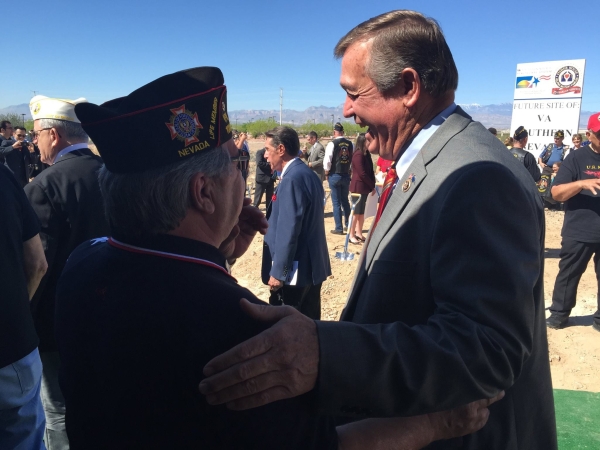
As the end of 2015 approaches, officials with Pahrump’s Disabled American Veterans Chapter 15 are wishing a happy and safe holiday season to all in the Pahrump Valley.
The organization is also reminding veterans who may be new to the community about many of the services it provides to veterans.
During the past year, the DAV has assisted 1,123 veterans seeking the benefits they have earned.
Terry Janke, public information officer, said the organization’s service officers have also filed and provided follow-up work on at least 220 benefit claims.
The organization also provided wheelchairs to veterans in need, and have driven more than 21,517 miles, while transporting 935 veterans to medical appointments in 2015 alone.
The DAV’s office is located in the lobby of Desert View Hospital.
Janke noted that the agency is continually focused on the community’s homeless veterans, even though resources in Pahrump are virtually non-existent.
“Nationwide, it’s a continuing problem, which is very alarming,” he said. “Locally, It’s strange out here because we don’t really have the facilities for homeless veterans, whether they are just passing through town or they find themselves homeless here in Pahrump.”
Janke said over the years, efforts have been made to locate and track homeless veterans, many of whom are eking out an existence in the foothills of the valley.
Some of the veterans he said are living homeless right in the heart of the community.
“I know of one veteran living out in the desert behind the Walmart shopping center,” he said. “He had just come back from a medical procedure in Las Vegas and they just dropped him off out there. We go out into the hills and provide water for the veterans that we know are living out in the desert. Most of it is on the east side of Highway 160 toward the hills.”
Janke also said the agency’s homeless chairperson is getting daily calls from homeless veterans in need of the DAV’s services.
“Ken Washington is constantly being called out, and we will normally put them up for a night at a local hotel room,” he said. “The following morning, he will transport them into Las Vegas to get them hooked up with a shelter out there.”
At the same time, Janke said some homeless veterans he’s encountered in the past don’t want any assistance or services from the agency.
“I can say from personal experience, I have dealt with homeless veterans back in Ohio before I moved out here to Pahrump, and there are some who don’t trust the government,” he said. “Some of them really don’t want any help and they are perfectly happy to be living their lives the way they are living. There’s not many of them like that, because most of them are hoping to get back on their feet and finding a job. Back in Ohio, one of the guys that I worked with did nothing but find jobs for the homeless veterans in the Columbus area.”
One issue Janke spoke of is a condition a majority of veterans who have been deployed in war zones have in common – suicides.
“As far as the high suicide rates among veterans, my own personal experience has been just a feeling of helplessness,” he said. “There are also psychological issues in a lot of cases. I am a Vietnam veteran myself and I know that PTSD is a big thing that came out of the Vietnam War, but it pales in comparison to what’s happening to our veterans who are returning today from Afghanistan and Iraq. Many of them are on their second and third tour.”
Financial insecurity, Janke said, is one major reason why some veterans are deployed multiple times overseas.
“I know guys in the Ohio National Guard who have had five deployments,” he said. “They would come back and couldn’t find a job, so in order to feed themselves and take care of their families, they would go ahead and volunteer for another deployment.”
As a result, Janke said many veterans with multiple deployments are now suffering from conditions known as Post Traumatic Stress Disorder (PTSD) and Traumatic Brain Disorder, associated with fighting in combat zones.
“The cases of PTSD that we saw in Vietnam I think has doubled when compared with those that are coming back from Iraq and Afghanistan,” he said. “The Veterans Administration put out some statistics on returning veterans who have other PTSD or traumatic brain injury, which is pretty high.”
Additionally, duties in combat zones, which for decades were considered safe, have proved to be just the opposite.
“The jobs that used to be considered rear-echelon, like a truck driver or something in the motor pool, were at one time safe jobs and even in Vietnam it was that way. But today with the IEDs and snipers and all that’s happening, there’s really no safe place anymore. It is very taxing on them mentally.”
Veterans wanting to learn more about benefits and services the DAV provides can get information by visiting Desert View Hospital.
“We have our veterans’ service officers there on Tuesday, Wednesday, and Thursday mornings,” he said. “We have three Veterans Service Officers who are nationally certified in applying for benefits. If they need immediate assistance, we have Ken Washington, who carries our DAV Chapter 15 phone, and they can call that number 24 hours a day and he will answer it if they need any assistance. For the next couple of weeks there won’t be anybody in the office because many of them are taking off for the holidays.”
Washington can be reached at (775) 537-5051.
Contact reporter Selwyn Harris at sharris@pvtimes.com.